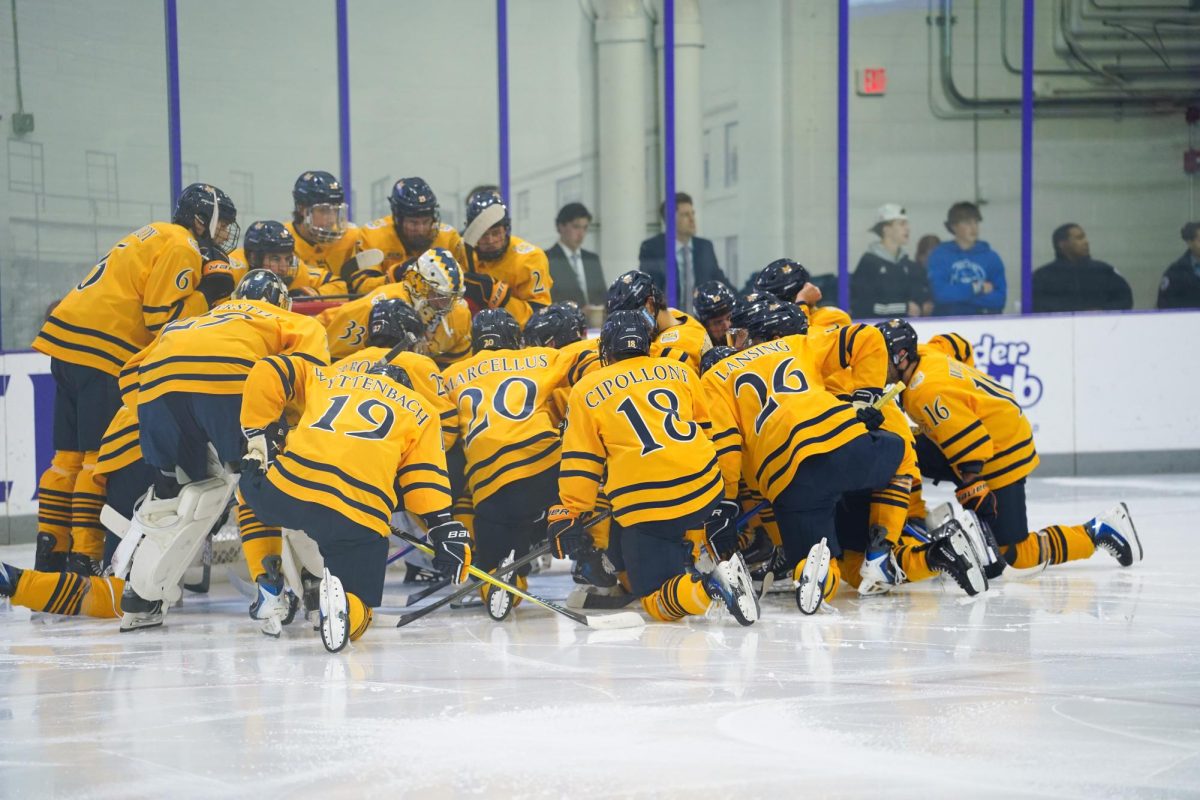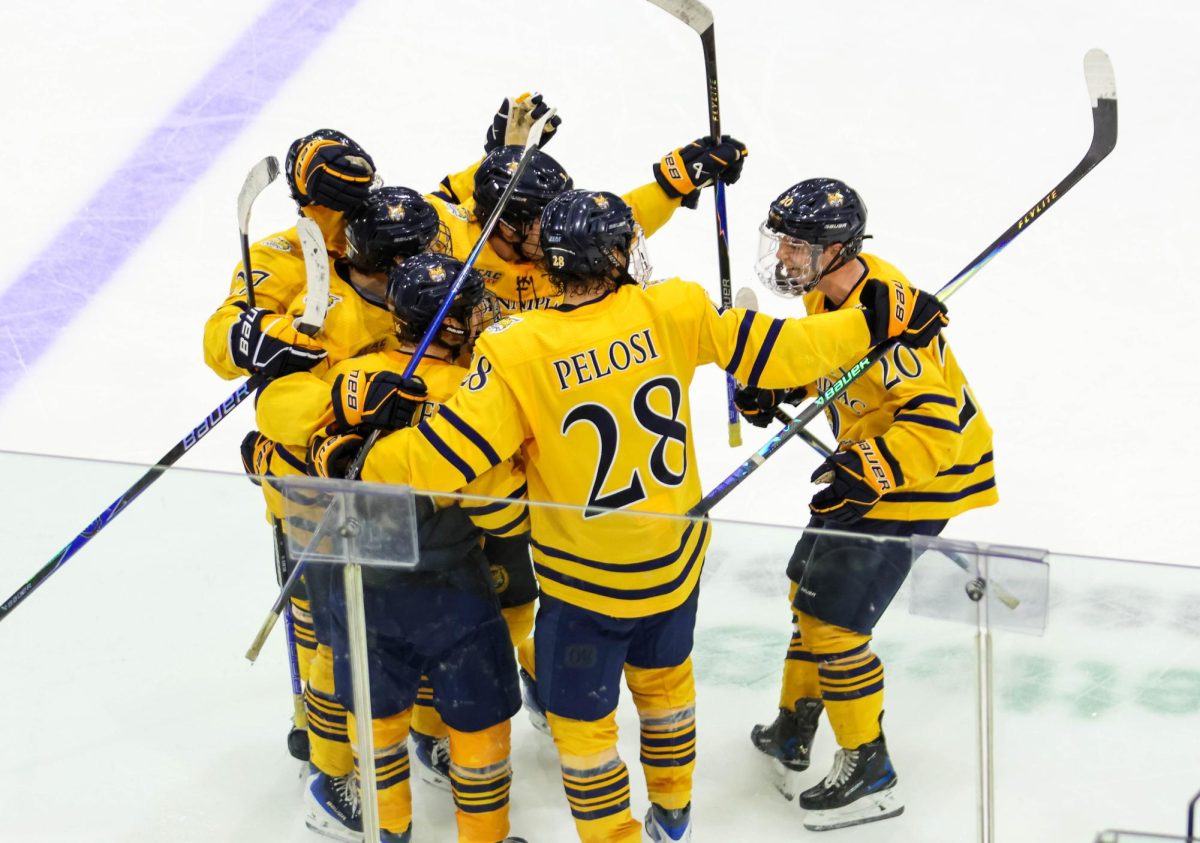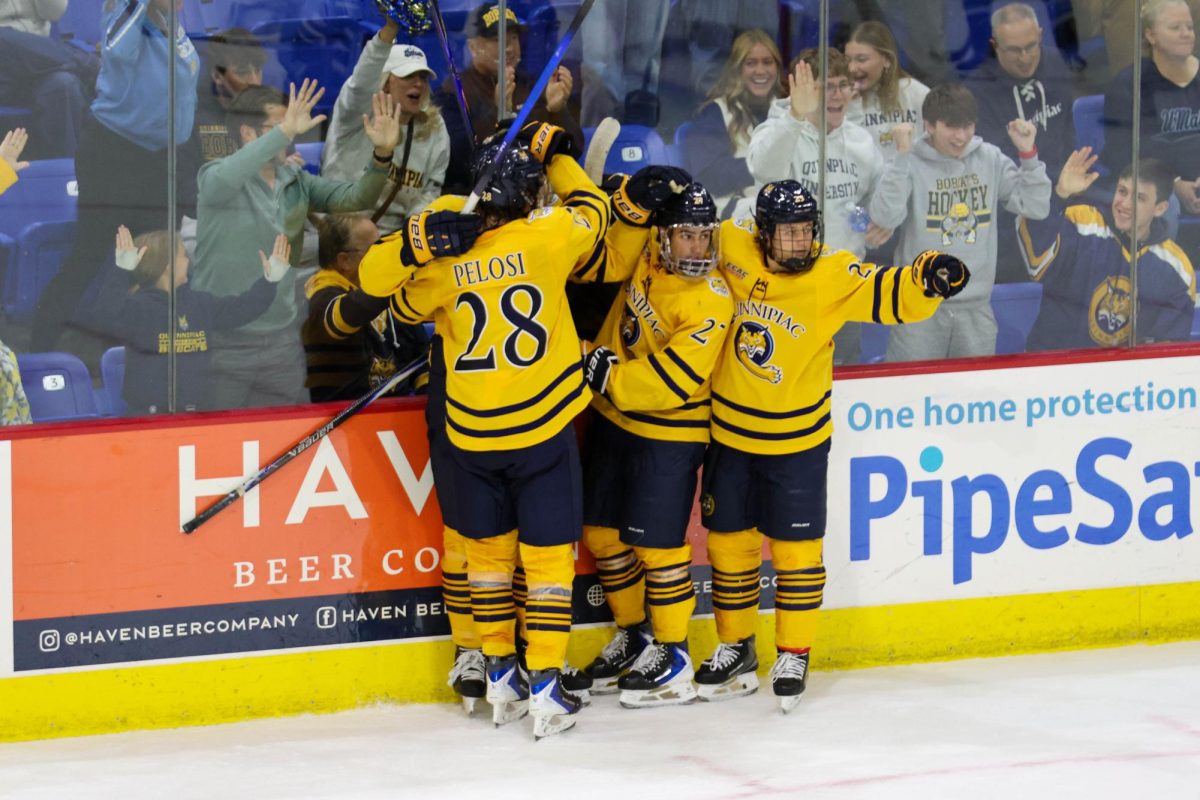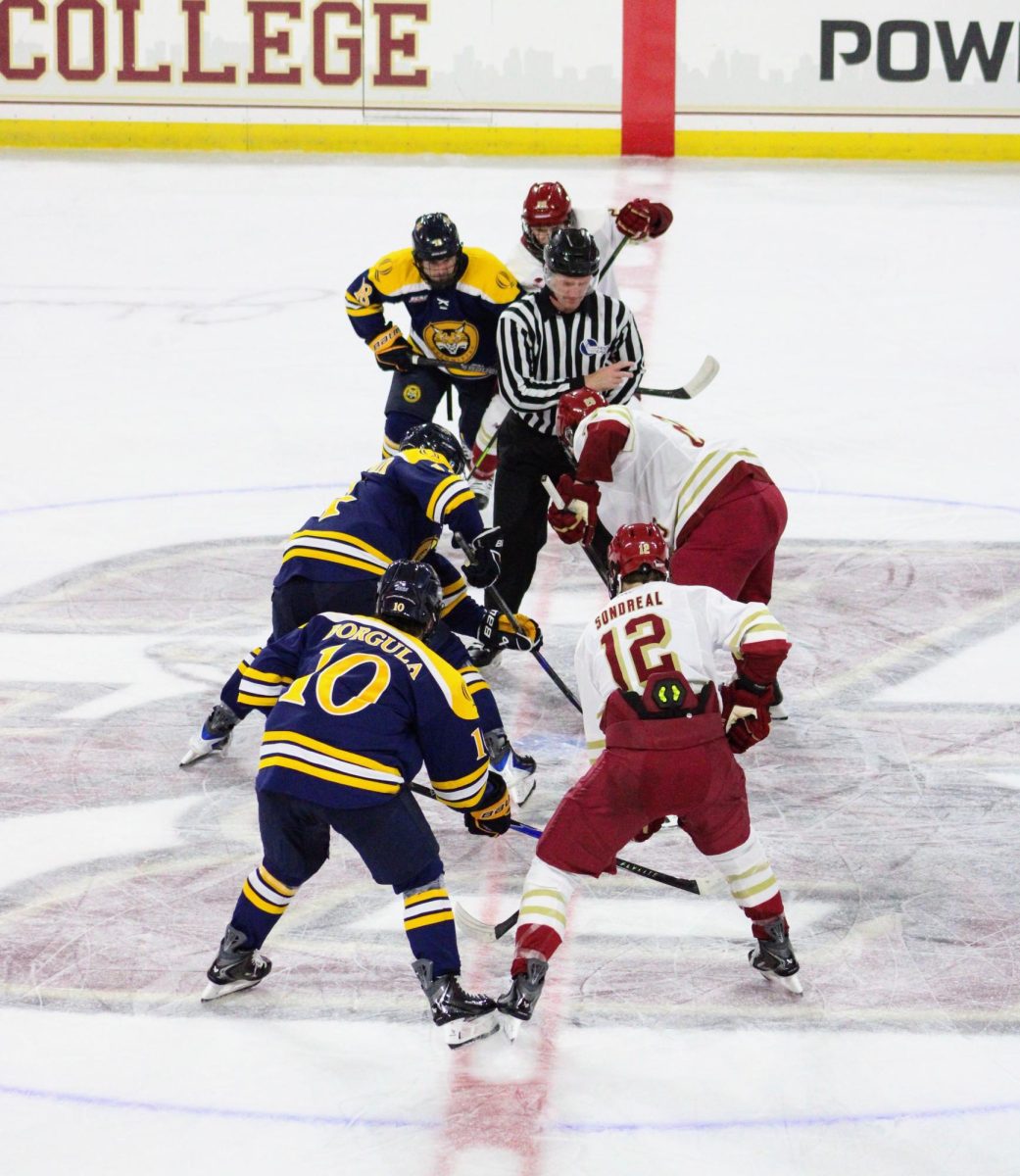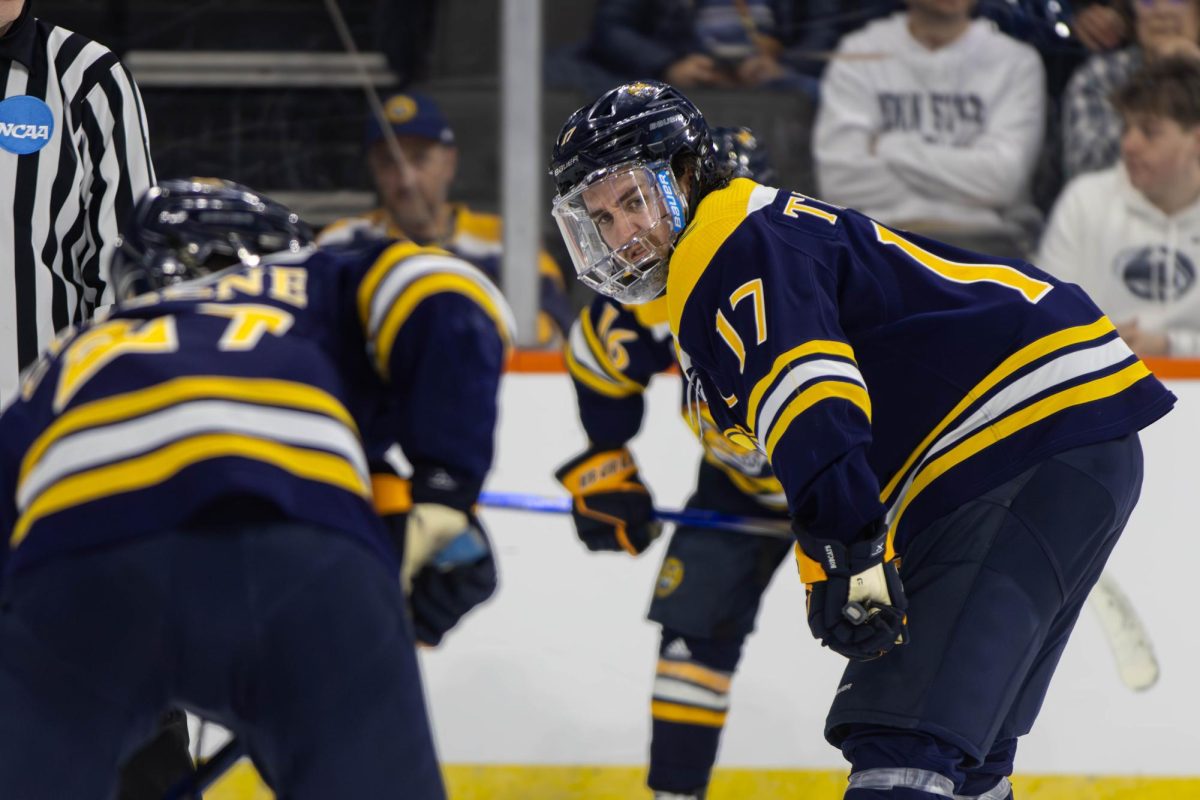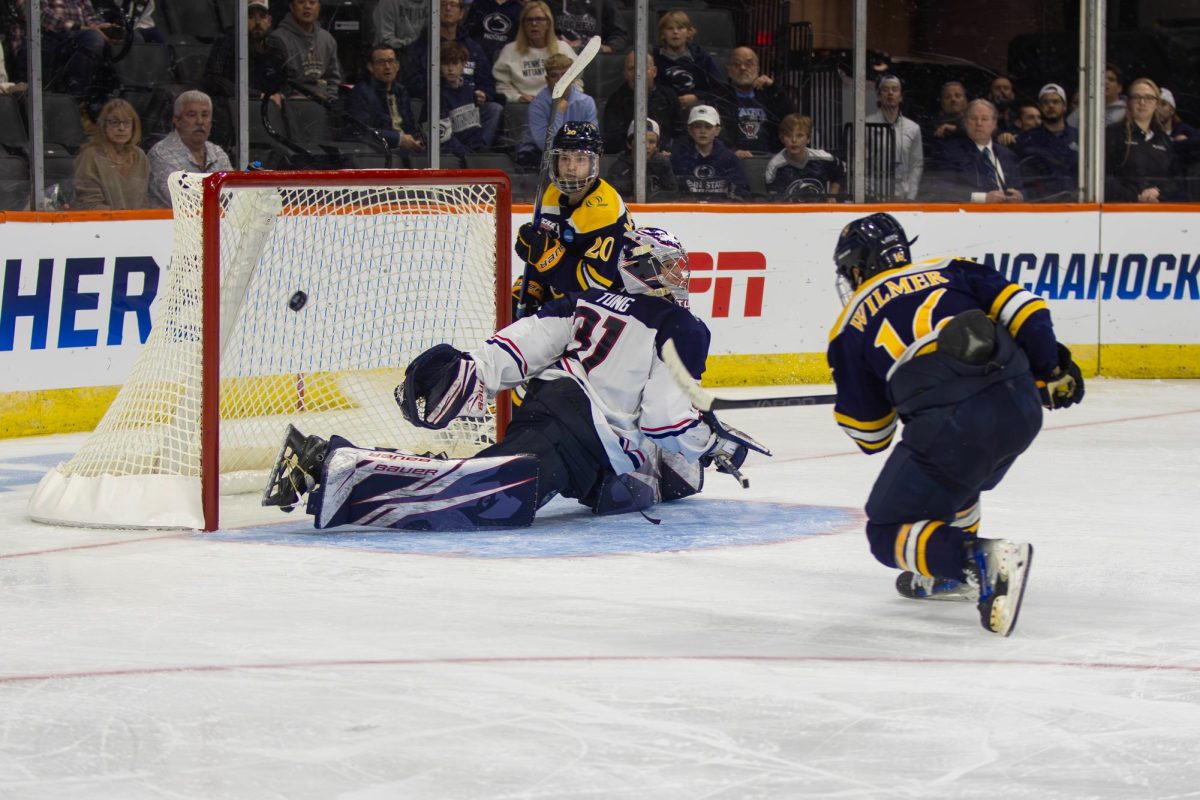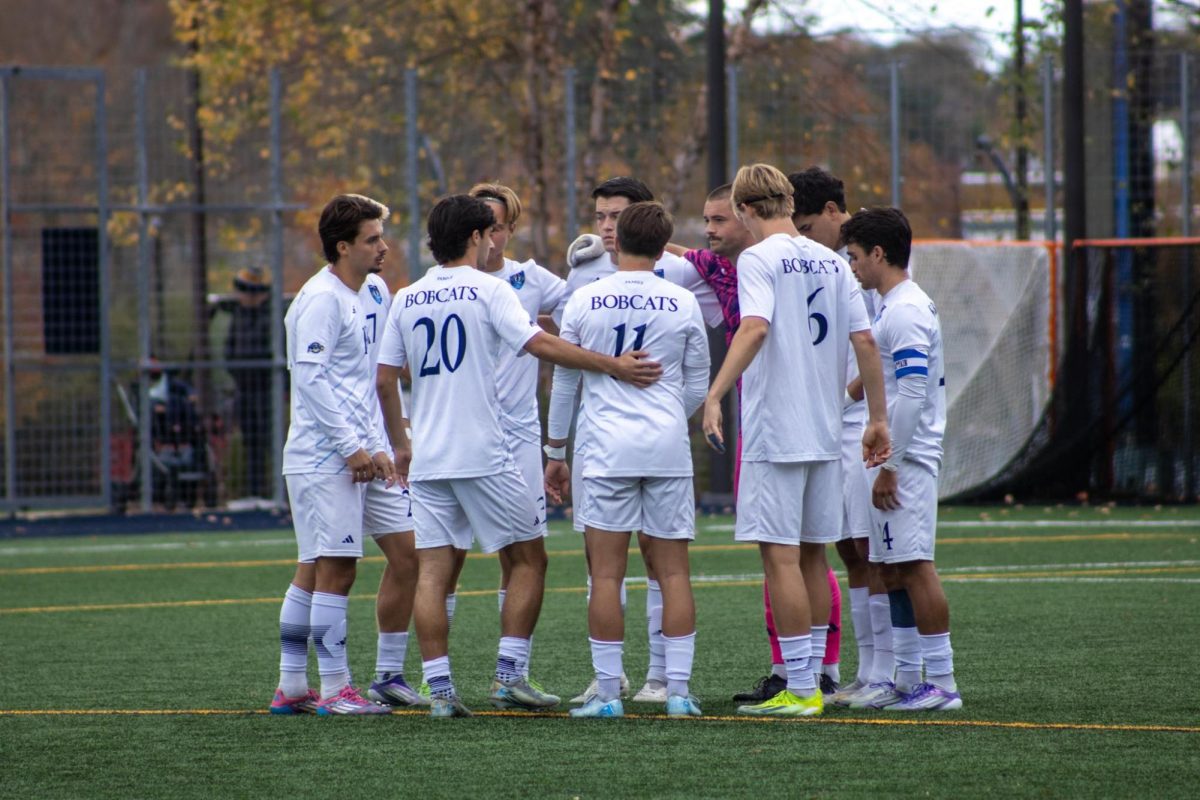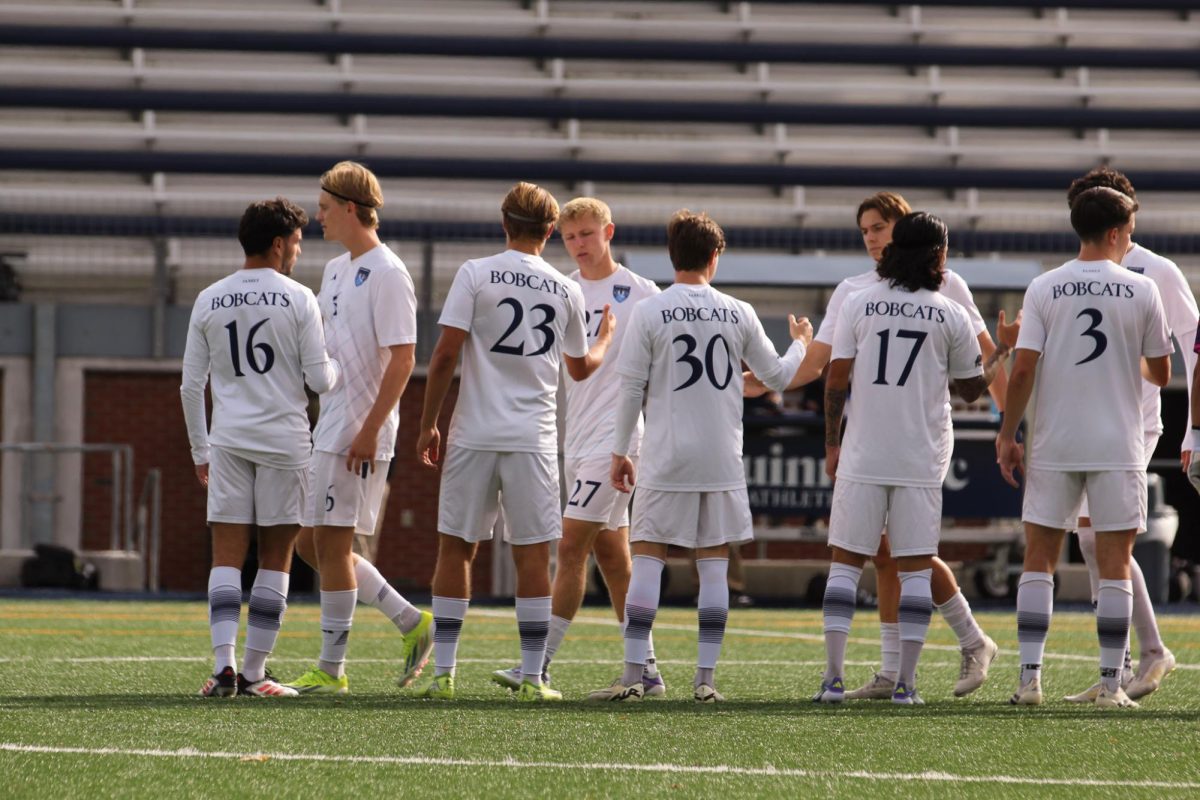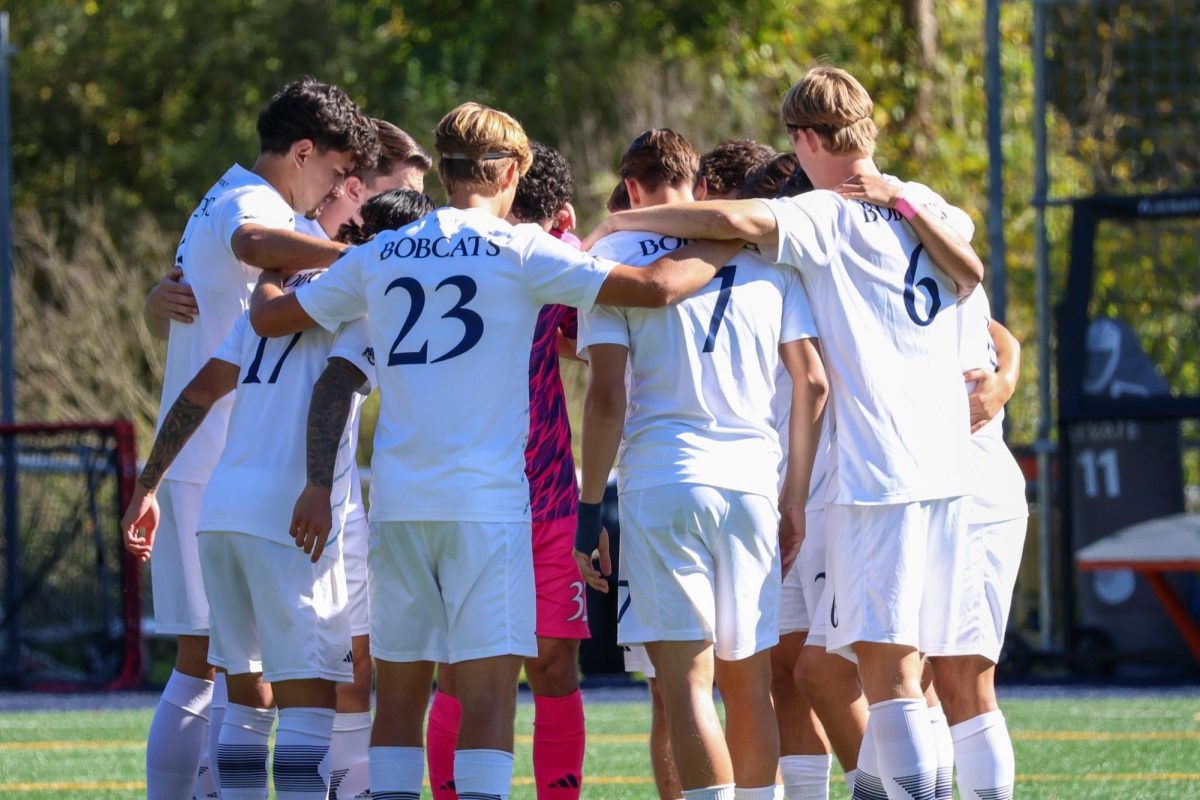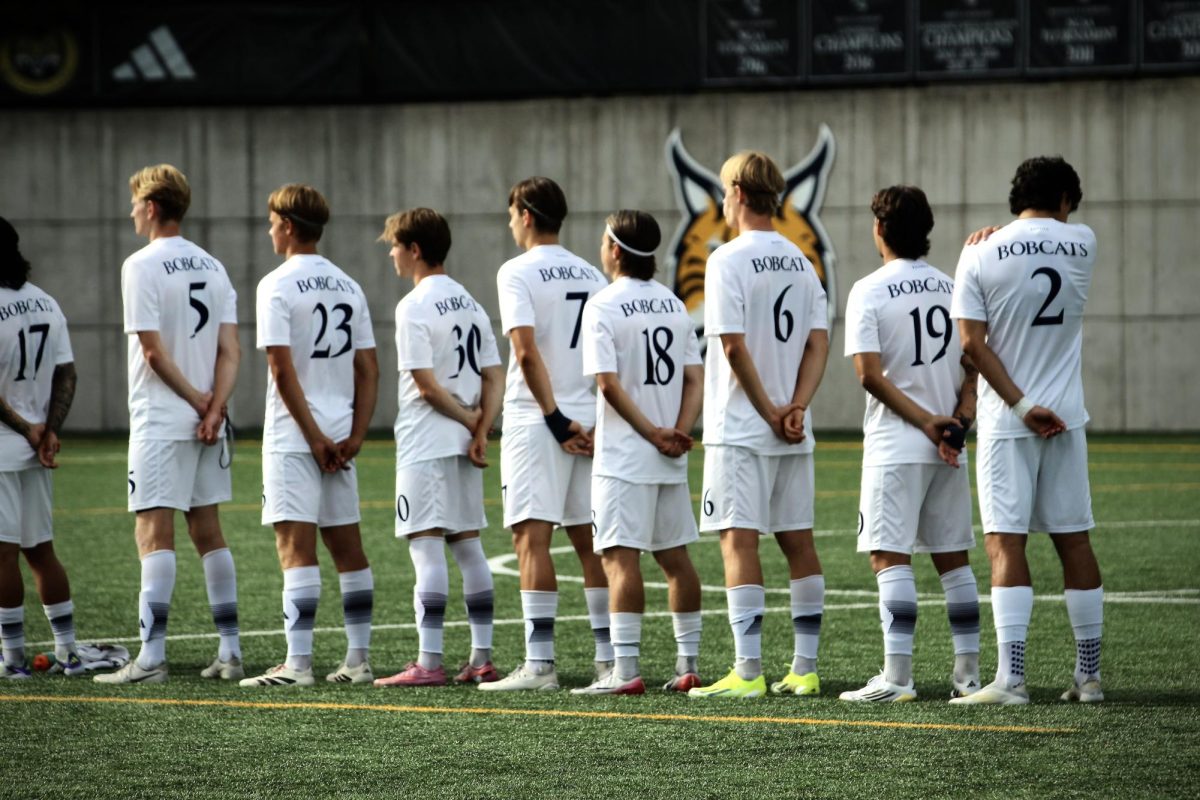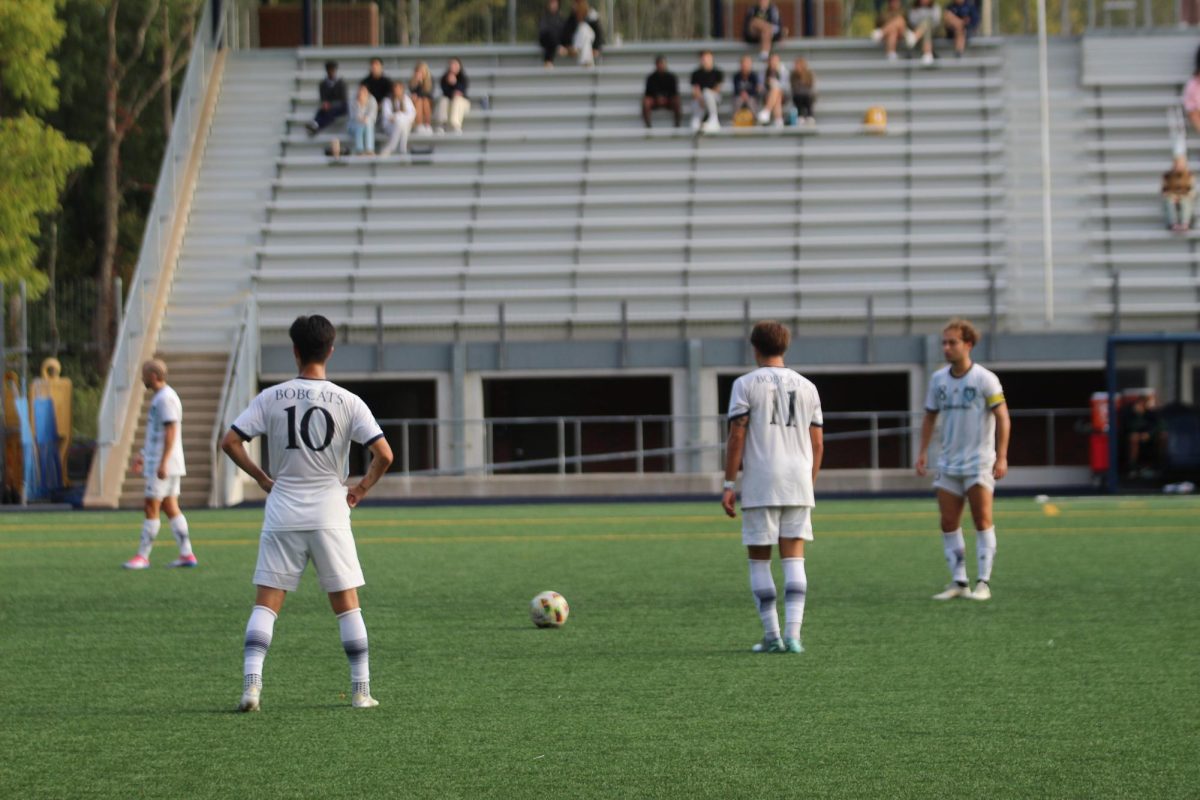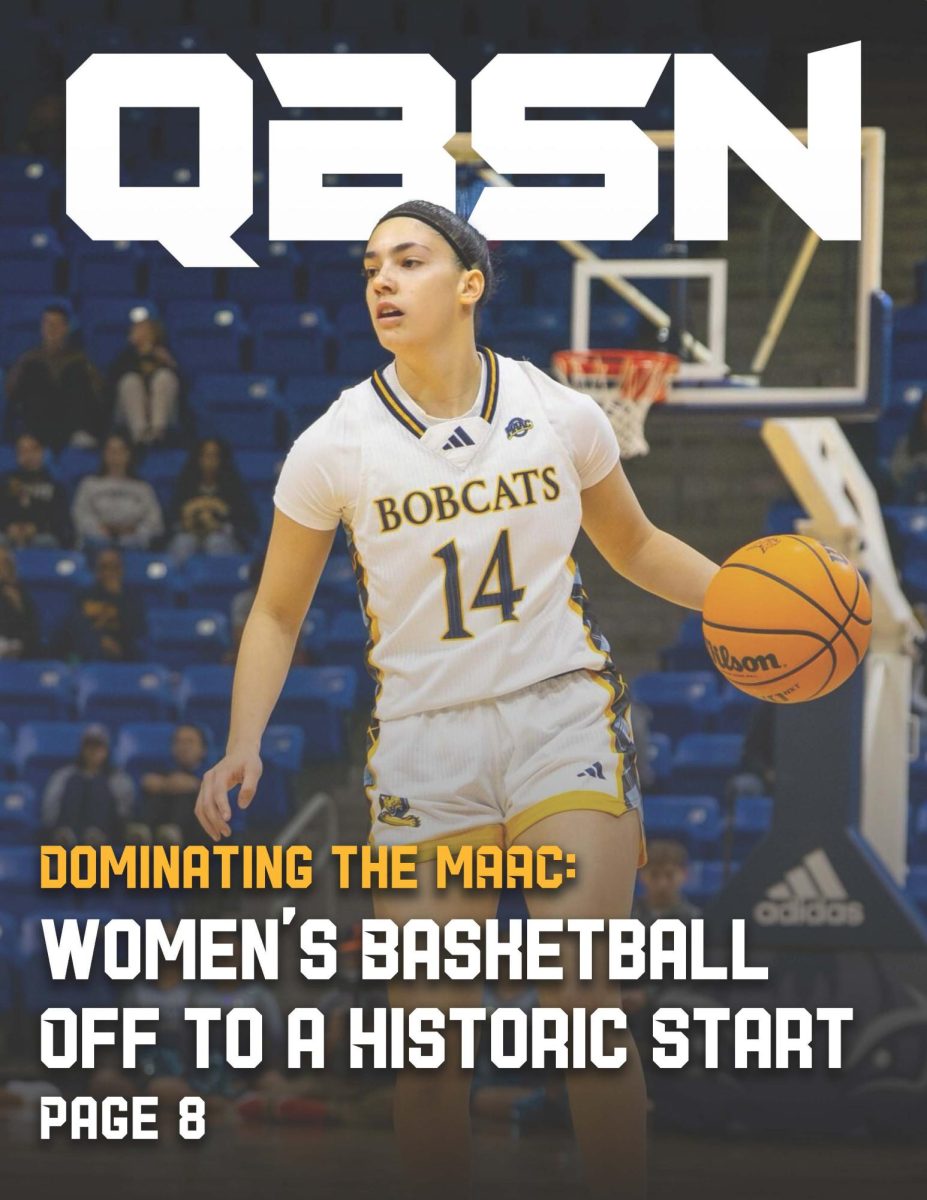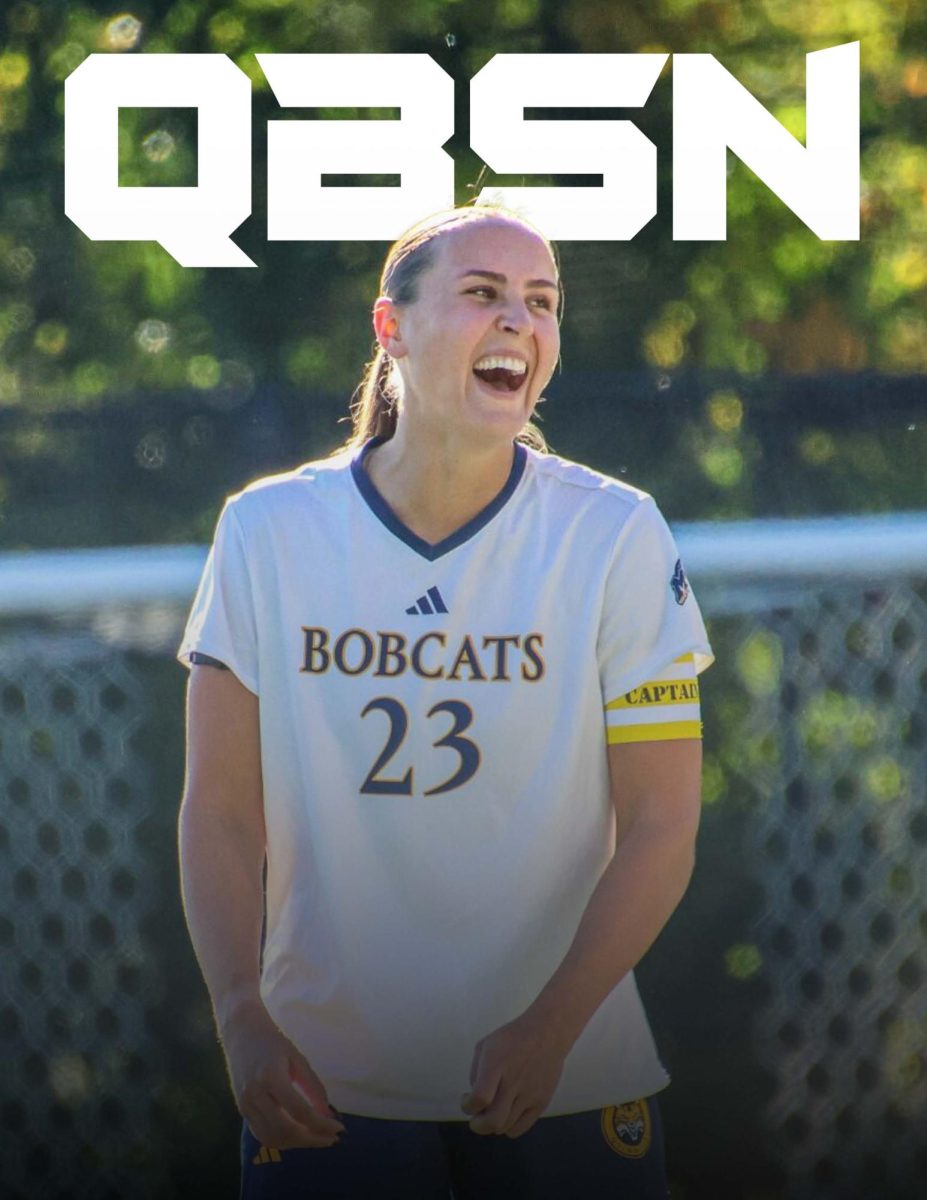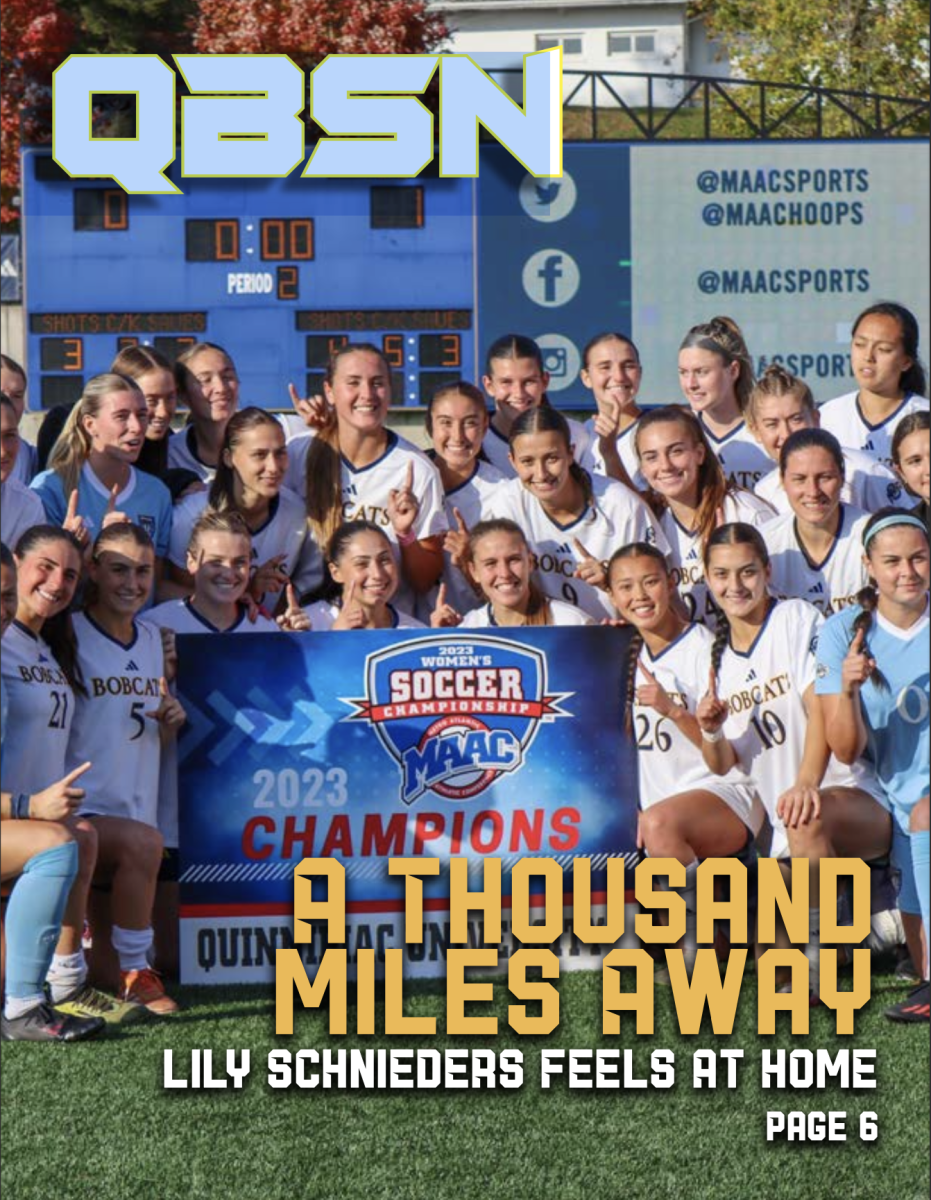Soren Jonzzon is more than just captain of Quinnipiac’s hockey team—he’s a well-rounded guy with big talent and big dreams
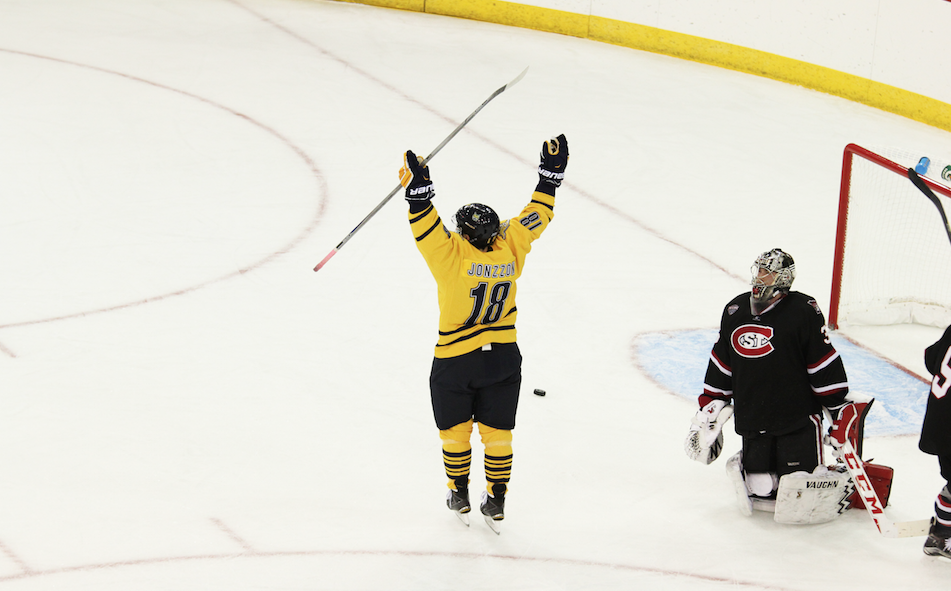
Soren Jonzzon lounges on his living room couch at the end of his first weekend off from ice hockey games in quite a while—a break that just so happened to fall on Halloween weekend.
“There’s no way that was intentional,” he says, laughing.
But now it’s back to reality. He just got home from a six-hour shift tutoring his peers in chemistry, physics and biology. “American Pickers” is on the TV in the background (he likes noise while he works), and he has one of his class discussion boards up on his laptop. The old English bulldog he and his housemates got a year ago, named after Juice from “Sons of Anarchy,” decides not to take Jonzzon’s cue to sit still. He’s too distracted by a fly behind the couch.
“Juice! Dude,” Jonzzon says.
He gets up and walks over to the wall, waiting. With patience and perfect hand-eye coordination, Jonzzon hits the wall and the fly drops. He returns to his seat.
“See, Juice? All better.”
It’s 9:30 on a Sunday night, and Jonzzon is trying to post discussion board comments for a class. They’re due in an hour, but only he and one other classmate have posted, so he’s stuck waiting on everyone else. His roommate, Jake, and Jake’s girlfriend Julie are on the couch next to him. Juice wanders around the room.
“See, Juice doesn’t understand the concept of a lazy Sunday,” Jonzzon says. “Sundays for Juice are like, ‘Why doesn’t everyone want to play?’ But we’re all crushing homework and we’re all tired from the night before and Juice, he’s just chillin.”
A lazy Sunday is a welcome reprieve for Jonzzon, whose schedule is usually jam-packed. Besides the typical demands from being on a Division I hockey team—daily practices, lift, travel and games—he has the added responsibility of being team captain. He’s the vocal one in the locker room before games or after the other team scores, he leads parts of practice, and if his coaches need help dealing with his teammates, they go to him. But leading a DI hockey team to an 11-0 start (and being on the first team to do so since Air Force in 2008-09) might be the least interesting thing about him.
Jonzzon came to college with more than a year’s worth of credits completed in high school. He is an avid Spongebob watcher. He wants to be a trauma surgeon. And, he never shies away from trying new things—within reason, that is.
Two summers ago, he worked as a school orientation leader, and in October he tried his hand at comedy, hosting an episode of Quinnipiac’s student-run late night show. He has applied to medical schools and shadows intermittently at Yale-New Haven Hospital’s emergency department. On Sundays he tutors at the Learning Commons, and on Tuesdays he works with a high school hockey team during skate practice. Soon he’ll be adding private hockey lessons for a 13-year-old to his to-do list.
Perhaps the most impressive part of it all: Jonzzon doesn’t use a planner. He just might add the occasional reminder on his phone for anything that’s “out of the blue.”
Such a schedule could be overwhelming for the average college student, but not for Jonzzon. He is California cool and always in control.
“I like being busy,” he says. “There are definitely times where I would be an absolute bum and do nothing, but for the most part, if I sat around for six hours a day, I would probably lose my mind. I can only play so many video games.”
Tom Hilbrich, one of Jonzzon’s teammates, has lived with him for the past three and a half years. He says Jonzzon has a quirky sense of humor (dad jokes, if you will), can fall asleep anywhere and has an insane work ethic.
“He can study at any time. You could be watching TV and he’s just reading a textbook on something that I can’t even pronounce,” Hilbrich said. “He can just retain information like that and I could tell that he was very focused early on.”
To Quinnipiac assistant coach Bill Riga, it was clear Jonzzon was coming into college steps ahead in terms of maturity and focus. Jonzzon left home at 16 years old to pursue junior hockey, so he had to learn life skills along the way from his older teammates and the host families he lived with.
Riga first met Jonzzon outside of the locker room after a game, when he was playing in the USHL for the Youngstown Phantoms in Ohio. He didn’t know about Jonzzon’s academic goals, but his first impression was still a strong one.
“I started to get a feel then for the kind of person that he was, looking you in the eye, giving you a nice firm handshake to start off,” Riga said. “Then as you speak to him you start to realize the depth of his intelligence [and] his personality … kind of indicate his maturity. … I don’t think anything he does here is over his head. I think he can handle pretty much anything you throw at him.”
Despite this maturity, Jonzzon did struggle a bit during his first two years on the team when he didn’t have a consistent spot in the lineup and was trying to find his place as a player. But at the end of his sophomore year, the coaches brought in a group to do Navy SEAL training with the team to detect leadership. Riga said Jonzzon stepped up and stood out as MVP of the exercise. This must have stuck with his teammates—they voted unanimously for him as captain at the end of last season.
“He took [that experience] into his next season with his new confidence and just had a great year last year,” Riga said. “He took over that Navy SEAL exercise, then he took over his hockey career, then combined that with all of his academic achievement. He’s just a leader.”
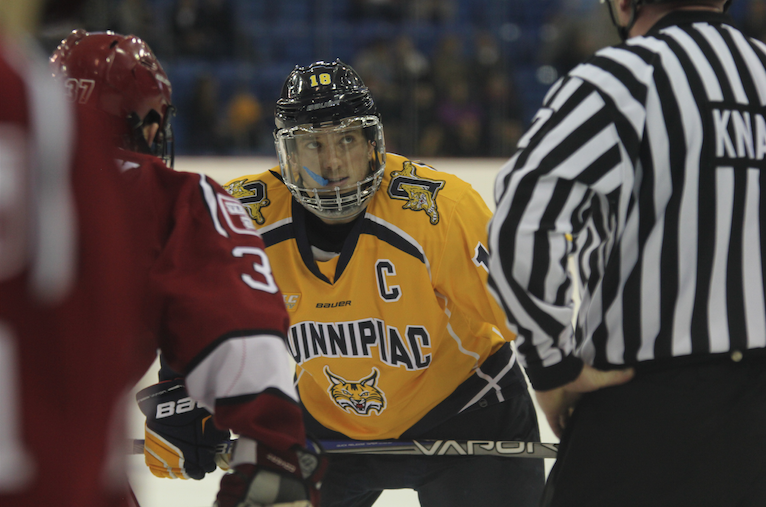
Jonzzon also inspires loyalty.
In 2010, he was traded from the Waterloo Black Hawks in Iowa to the Tri-City Storm in Nebraska, even though his coach had committed to keeping him for the following season. The grandma in his host family canceled their season tickets to the local team after she found out.
“They had been season ticket holders for forever,” Jonzzon’s mother Kathy said. “[The grandma] felt like, OK, you just messed up. So she just dropped her season tickets.”
But now at Quinnipiac, with Jonzzon’s newfound confidence and his humble approach to life, he easily motivates those around him.
“He’s very modest about everything,” Hilbrich said. “… I think if I didn’t live with him I wouldn’t know half the stuff that he actually does. He’ll leave in a suit at 8 p.m. and we’re like, ‘Where are you going?’ ‘I’m going to shadow a doctor.’ I’m like, shit, I need to get out there and do something.”
Jonzzon’s dedication comes from a love of learning. It seems he was always this way. Born and raised in the Silicon Valley, his desire to know more came at an early age.
“He figured most stuff out, [like] child locks, and when he saw you do it once, he knew how to do it, and that was it,” his father Bernt said. “So, yeah, that was a problem.”
As a kindergartener, Jonzzon was already adding up three-digit numbers. He would ask questions about how things work and he would poke at dead squirrels on the road, his father said. Jonzzon picked up quickly on the game of hockey at only four years old. Bernt’s father, who is from Sweden, used to take Jonzzon and his older step-brother Eric to practice with a family friend who played semi-professional hockey in Sweden. His friend noticed Jonzzon’s eye for hockey and suggested Bernt start taking him to lessons.
Jonzzon was hooked and immediately dedicated to the game.
“After each season I’d sit down and talk to him, and always asked him, ‘So Soren, is Dad buying a new car this year or are you going to play hockey?’” Bernt said. “And I’d get the same answer every year: ‘Sorry, Dad. No car.’”
On top of bringing him to hockey camps and practices, Bernt fostered a culture of curiosity in the Jonzzon home.
“When he asked questions, I tried to get him to answer them instead,” he said. “So instead of just telling him why something happened, I would always ask him, ‘Why do you think it happened?’”
While Kathy, was at work, Bernt was a stay-at-home dad. He worked closely with Eric, who struggled with ADHD. Bernt gave Jonzzon work, too, so he was constantly learning along with his brother. It was through comparing their learning processes, Kathy said, that Jonzzon gained a sense of maturity and understanding.
“He grew up knowing how easy it is for him to learn and for him to grasp concepts and things, and he knew that his older brother, to make that same level of achievement, took so much more,” Kathy said. “He just got a real appreciation for the difference in learning styles.”
Jonzzon often brought this patience and caring nature outside of the house. On play dates, he would always include the friend’s younger siblings when they wanted to join in. When he got a bit older, Kathy remembers him being the go-to for his girl friends to confide in with their boy problems.
“He was just always one of those kids that people went to, to kind of figure things out,” she said. “So, he’s just always had this gentle soul.”
Jonzzon and his parents are very close. When he left for Quinnipiac, he made his parents a memory book with pictures of the family and sayings underneath each one.
“He wrote us a letter at the end, which said … how appreciative he was and he knows how difficult of a decision it was to let your child at 16 years old to go off and start a life on his own, and trust that the people that he’s going to be with are going to be good for him,” she said. “Well, we both were half crying by the time we were done with it.”
It’s part of the Swedish culture to be open, his parents say, and Jonzzon is not afraid to seek advice when he needs it although he always tries to figure things out first. He calls his dad with girl problems and hockey problems and calls his mom with business-related problems—or when he’s annoyed with his dad.
But more recently, Kathy has noticed they have been turning to him for advice instead.
“It’s almost like we’ve gotten to this different relationship now, where he’s sort of helping us, and he sees life from a broader perspective,” she said.
Besides helping his parents, Jonzzon is determined to be a doctor and help strangers, as well.
“As I’ve gotten older and matured more, I’ve realized that not only does [being a doctor] help the person you’ve helped, but their family, their significant other … the impact that you have goes beyond just the person you see,” he says. “You might have a person who, for lack of a better term, should be dead, and suddenly now they have another 10 years or 15 years until some type of other illness strikes them. So to have that, I can’t think of a more rewarding feeling.”
He loves a good medical show (the ones less focused on drama) and so far hasn’t been scared off by anything he’s witnessed in Yale’s emergency room.
“I’ve always liked the sciences and I’ve always thought the way that the human body works is extremely interesting, and it just like seemed like there was way too much going on to make sense,” Jonzzon says. “But now that I’m learning it, some of it does.”
While Jonzzon is open to any future possibilities in professional hockey, Riga said, medical school is a definite for him.
“It’s not that he isn’t capable of playing pro hockey,” Riga said. “It’s just not where he’s focused on.”
And no matter what happens, Riga is confident Jonzzon will bring his level of dedication and passion to every aspect of his life.
“It doesn’t faze him—he just takes it in stride like it’s easy for him,” Riga said. “… It’s remarkable. I have no doubt he’s going to be a great surgeon.
“But he’s also going to be a great family guy, and he’s going to be a great dad, if he wants to do that. He’s going to be able to compartmentalize all those things and be really good at a lot of different things, and that’s not easy to find. And not at the level he does it at. For sure.”



